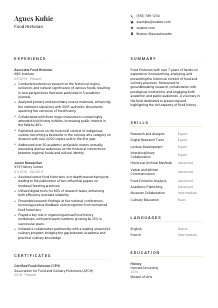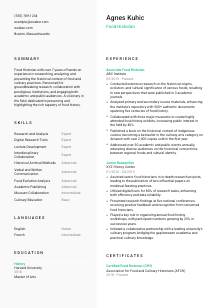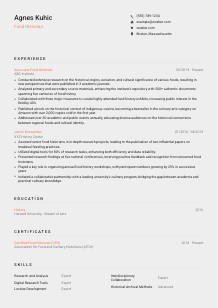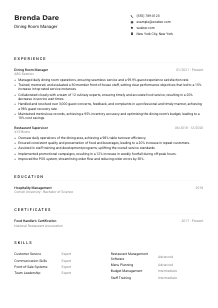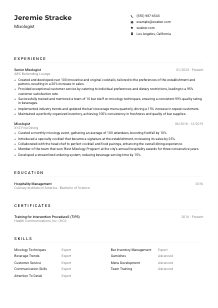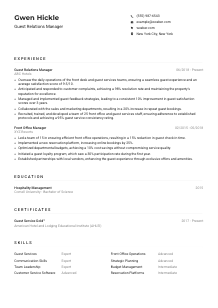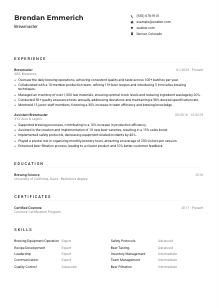Food Historian Resume Example
Delving into culinary past, but your resume feels under-seasoned? Explore this Food Historian resume example, crafted with Wozber free resume builder. Learn how to blend your historical expertise with job requirements, cooking up a career that's as rich in flavor as the dishes you study!
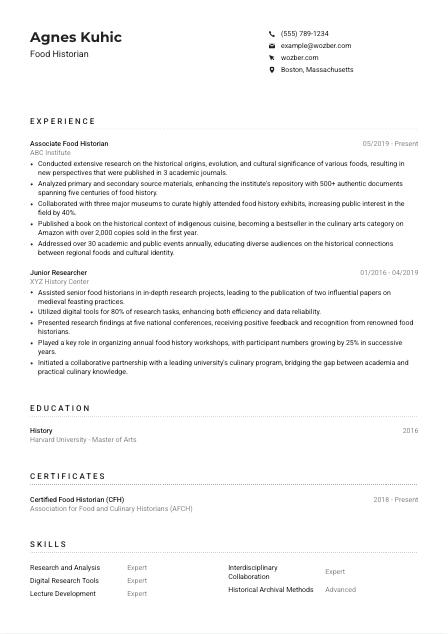
How to write a Food Historian Resume?
Aspiring Food Historian ready to embark on a savory career journey? Your resume is more than just a collection of experiences—it's your front-line warrior in the job market, your beacon of achievements, and most importantly, your ticket to captivating the hearts (and minds) of hiring managers. With Wozber's free resume builder, master the art of sculpting an ATS-compliant resume that mirrors your passion for the gastronomical past. Let's journey together through the art of blending your historical expertise with precision, creating a resume that's as rich and layered as the culinary history you aim to explore!
Personal Details
Kickoff your journey into the Food Historian role with a personal detail section that's as appetizing and refined as your research topics. This section is your opportunity to say, 'Hello, I'm here and ready to bring history to your table.'
1. Your Name as Your Brand
Just as a dish begins with quality ingredients, your resume starts with your name. It's your brand, your hallmark within the culinary Chronicles. Ensure it's the first thing to catch the eye by using a clear, readable font. Let your name be the sumptuous start to this feast of qualifications you're about to serve.
2. Title Your Expertise
Immediately below your name, append the title 'Food Historian.' This signals to recruiters that you're speaking their language. It's akin to presenting your specialty dish upfront—enticing and direct.
3. Contact Information: Your Calling Card
- Phone Number: Include a reliable contact number—this is how the culinary institutions will say they want a seat at your table. Double-check for accuracy; a missed digit could mean a missed opportunity.
- Professional Email Address: Use a professional email that you check regularly. Ideally, your first and last names should be clear. It's the digital doorway through which opportunities will come knocking.
4. Location as Your Kitchen
State your location as 'Boston, Massachusetts', aligning with one of the job's prerequisites. It's akin to choosing the right kitchen for meal prep; it tells employers you're ready and in the right place to start cooking up historical revelations.
5. A Professional Profile to Set the Scene
Consider adding a link to a professional website or LinkedIn profile, showcasing your network like a well-polished silver platter. However, ensure it reflects your resume's content—the flavors must match for an unforgettable experience.
Takeaway
Your Personal Details are the amuse-bouche of your professional journey, a tantalizing start that sets the tone. Keep it neat, informative, and aligned with the flavors of the job you aim to season with your expertise. Let it reflect your readiness to bring history to life through food.





Experience
This is where you lay out the courses of your career, each role reflecting a key ingredient in your journey as a Food Historian. Let's ensure this section is as meticulously curated as a medieval feast.
- Conducted extensive research on the historical origins, evolution, and cultural significance of various foods, resulting in new perspectives that were published in 3 academic journals.
- Analyzed primary and secondary source materials, enhancing the institute's repository with 500+ authentic documents spanning five centuries of food history.
- Collaborated with three major museums to curate highly attended food history exhibits, increasing public interest in the field by 40%.
- Published a book on the historical context of indigenous cuisine, becoming a bestseller in the culinary arts category on Amazon with over 2,000 copies sold in the first year.
- Addressed over 30 academic and public events annually, educating diverse audiences on the historical connections between regional foods and cultural identity.
- Assisted senior food historians in in‑depth research projects, leading to the publication of two influential papers on medieval feasting practices.
- Utilized digital tools for 80% of research tasks, enhancing both efficiency and data reliability.
- Presented research findings at five national conferences, receiving positive feedback and recognition from renowned food historians.
- Played a key role in organizing annual food history workshops, with participant numbers growing by 25% in successive years.
- Initiated a collaborative partnership with a leading university's culinary program, bridging the gap between academia and practical culinary knowledge.
1. Dissect the Job Description
Start by highlighting keywords and phrases from the job description. 'Conduct in-depth research,' 'analyze primary and secondary source materials,' and 'collaborate with museums' are not just tasks – they're your stories to tell.
2. Structure Your Service History
Present your roles in reverse-chronological order, highlighting your progression in the culinary history field. Each entry should include the job title, place of employment, and dates, crafting a timeline of your professional evolution.
3. Plate Your Achievements
Describe significant accomplishments within each role using active language and action verbs. For instance, 'Collaborated with three major museums' showcases your ability to engage and contribute to significant projects.
4. Season with Numbers
Whenever possible, quantify your success. If 'Published a book...becoming a bestseller,' specify the number of copies sold. Numbers are like seasoning; they enhance and give depth to your contributions.
5. Keep It Savor-worthy
Stick to experiences directly relevant to the Food Historian role. Just as a focused menu is more appealing, a resume focused on pertinent experience is more enticing to recruiters.
Takeaway
Your Experience section is the main course of your resume, substantial and satisfying. It should leave recruiters craving to learn more about your unique blend of skills and achievements. Make every word count and endeavor to show, through tangible examples, why you are the perfect candidate for a role in culinary history.
Education
In the realm of Food Historians, your educational background is akin to the foundation of a classical dish, indispensable and rich in substance. Let's craft this section to highlight your academic journey without overshadowing your practical experience.
1. Match the Degree Requirement
Echo the job's educational requirements by listing your relevant degrees. For instance, being a 'Bachelor of Arts in History' graduate not only meets but proves an in-depth understanding of the historical context vital for a Food Historian.
2. Structure with Academic Flavor
Present your academic credentials clearly. Include the degree, field of study, educational institution, and graduation year. This clarity affords recruiters an immediate understanding of your academic background, akin to reading a well-laid-out recipe.
3. Highlight Pertinent Studies
If your degree directly aligns with the role, as with a 'Master of Arts in History,' it's the perfect garnish for your resume. It signifies not just completion but mastery and dedication to the field.
4. Mention Courses or Thesis Work
Include coursework or thesis work only if it directly enhances your candidacy. For a Food Historian, dissertations on food in historical contexts or classes in archival research are especially palatable to employers.
5. Academic Achievements as Seasoning
Relevant honors or recognitions act as seasoning to your education section. They enrich the section, reflecting a dedication above and beyond basic requirements, but remember, the main flavor should always be your degrees and how they prepare you for the role.
Takeaway
Your educational background serves as the solid foundation upon which your career is built. For a Food Historian, showcasing a blend of historical knowledge with culinary arts or related fields demonstrates not just readiness but passion for the intricacies of food's past. Let this section be the proof of your dedication to understanding and preserving culinary history.
Certificates
Although the job posting for a Food Historian might not explicitly require certifications, presenting them smartly can set you apart. They are like the rare spices in your pantry, not always essential but can significantly enhance the final outcome.
1. Revisit the Job Description
Though our example job listing did not specifically demand certifications, evaluate whether any of your credentials can address implied needs or demonstrate extended expertise.
2. Selectivity is Key
Highlight certificates that directly contribute to your role as a Food Historian. For instance, a 'Certified Food Historian' credential, if available, directly reaffirms your dedication and expertise in the field.
3. Dates Where Applicable
For certifications with expiration dates or those recently achieved, include the dates to show your knowledge is fresh and up-to-date, much like ensuring your ingredients are of the best quality.
4. Continuous Learning
The culinary and historical fields are always evolving. Keep updating your certifications and seeking out new learning opportunities that align with your career aspirations in culinary history.
Takeaway
Like a master chef's signature seasoning, the right certifications on your resume for a Food Historian role can significantly enhance your professional profile. They validate your expertise and show a commitment to continuous learning and excellence in your field. Cultivate your collection with care.
Skills
Your Skills section is like a well-organized spice rack, each skill a crucial ingredient in the dish that is your professional portfolio. Let's ensure this section is optimized to bring out the best flavors in your candidacy.
1. Decipher the Required Skills
Diligently comb through the job posting to identify both the stated and implied skills. For our Food Historian example, 'Research and Analysis' and 'Digital Research Tools' aren't just skills; they're essential tools in your culinary history toolkit.
2. Match and List Your Skills
Align your own arsenal of skills with those sought for the job. If the job requires proficiency in 'Historical Archival Methods,' and you're adept at navigating archives, make sure it's highlighted front and center.
3. Organized and Focused
Resist the temptation to list every skill. Just as a dish can be over-spiced, a resume can be over-crowded. Prioritize the most relevant skills to the Food Historian role, ensuring clarity and impact.
Takeaway
Your skills section is a testament to your preparation and expertise in the gastronomical past, ready to be served to history and food enthusiasts alike. Carefully choose each skill to reflect the requirements of a Food Historian, showcasing your readiness to contribute substantially to the role. Like selecting the perfect blend of spices, your skills should enhance your professional narrative, making it irresistible to hiring managers.
Languages
Your ability to communicate in multiple languages in the Food Historian role can be akin to knowing the secret recipes from different cultures—valuable and sometimes crucial. Let's showcase your linguistic skills as a bridge to understanding and interpreting culinary history across borders.
1. Job Requirements Cross-Check
First up, verify if the position specifically requests language proficiencies. Our job example highlighted 'Ability to use English effectively in a professional setting,' instantly marking it as a crucial skill.
2. Prioritize Required Languages
Given the emphasis on English in our job example, ensure your proficiency level is prominently listed. Demonstrating mastery in the primary language of instruction or work is like ensuring you have the base ingredient for your culinary creation.
3. Additional Languages as an Asset
Supplement your resume with other languages you're proficient in. Each additional language is like adding another course to your feast—expanding your reach and showcasing your versatility.
4. Honest Proficiency Levels
Always portray your language skills accurately. From 'Native' to 'Basic,' clear descriptions of your proficiency level ensure that expectations are properly set, much like accurately describing a dish's spice level.
5. Role's Scope and Language
Understand the broad historical and cultural span of the Food Historian role. If it involves global cuisines or periods, having multiple languages can be advantageous, allowing you to delve deeper into primary sources.
Takeaway
Linguistic skills enhance your ability to research, understand, and communicate the intricate histories of culinary practices from around the world. In a field that celebrates diversity in cuisines and cultures, being multilingual can open doors to richer, more nuanced insights. Consider your language skills as essential ingredients in your professional repertoire, adding depth and flavor to your role as a Food Historian.
Summary
A compelling summary is the appetizer of your resume, enticing hiring managers to dive deeper into your culinary historiography feast. Let's craft a summary that highlights your savory skills and accomplishments, setting the stage for a memorable career as a Food Historian.
1. Blend the Job's Essence
Start by absorbing the essence of the Food Historian position. Understand the flavors and nuances, then prepare to blend your experiences and skills into a delectable introduction.
2. Begin with a Strong Introduction
Open with a statement that clearly defines you as a Food Historian, akin to stating your signature dish. Highlight your passion and the length of your experience right from the start, setting the taste for what's to follow.
3. Incorporate Key Ingredients
Mention a few of your most relevant skills, aligning with the job description. For example, if 'publishing research findings' and 'engaging academic and public audiences' are key responsibilities, include these to show you're ready to serve.
4. Keep It Crisp and Flavorful
Conciseness is key. Your summary should be a distillation of your career's essence, inviting the reader to explore further. Aim for 3-5 lines, each packed with information that's as enticing as the aroma of a finely prepared dish.
Takeaway
Consider your summary the invitation to a grand feast—your career. It needs to be compelling, highlight the best parts of your journey, and make hiring managers hungry to learn more. Blend your experiences and skills artfully, ensuring that you leave a taste that's both memorable and irresistible, paving the way for a successful career as a Food Historian.
Launching Your Food Historian Journey
Congratulations on meticulously crafting your Food Historian resume, a testament to your dedication and expertise. With each section fine-tuned and ready to impress, you're now well-equipped to apply for roles that excite your culinary and historical passion. Remember, your resume is the opening course to your professional banquet—make it unforgettable. Use Wozber's free resume builder, inclusive of ATS-friendly resume templates and ATS resume scanner, to ensure your document is perfectly prepared for the opportunities ahead.
Now, go forth and share the rich, flavorful history of food with the world. Your next great opportunity awaits!

- Bachelor's degree in History, Anthropology, Culinary Arts, or a related field.
- Minimum of 3 years' experience in researching and analyzing the historical context of food and culinary practices.
- Strong knowledge of historical archival methods and resources.
- Excellent verbal and written communication skills to present research findings to both academic and public audiences.
- Proficiency in using digital tools and databases for research purposes.
- Ability to use English effectively in a professional setting.
- Must be located in or willing to relocate to Boston, Massachusetts.
- Conduct in-depth research on the historical origins, evolution, and cultural significance of various foods and culinary practices.
- Analyze primary and secondary source materials to develop a comprehensive understanding of food history.
- Collaborate with museums, culinary institutions, and historical societies to curate food history exhibits and programs.
- Publish research findings in academic journals, books, or present at relevant conferences.
- Educate the public on the historical context of food through workshops, lectures, and media appearances.





